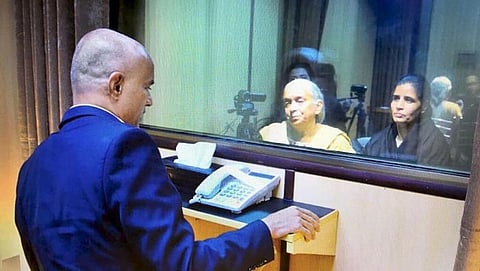
- Home
- Live Blog
- Breaking News
- Top Headlines
- Cities
- NE News
- Sentinel Media
- Sports
- Education
- Jobs

New Delhi: In denying India consular access to Kulbhushan Jadhav, sentenced to death by a Pakistani military court for alleged espionage, Pakistan has not only violated the Vienna Convention on diplomatic relations, Islamabad has also ignored a 2008 bilateral agreement on consular access. Islamabad has also stubbornly refused to agree to a Mutual Legal Assistance Treaty with India, or even ratify one under SAARC. In November 2008, India and Pakistan inked a bilateral agreement on Consular access to their prisoners in each others’ countries.
Pakistan, which has repeatedly denied India’s requests for consular access to Jadhav, has also failed to agree to a Mutual Legal Assistance Treaty (MLAT) with India. In September 2014, India had sent a fresh request to Pakistan to sign the MLAT. The reason why Pakistan has avoided signing an MLAT is because of its ceaseless support to cross border terrorism. Islamabad has ignored more than 40 MLAT requests from India.
The India-Pakistan bilateral agreement on consular access would in no way get diluted by the Vienna Convention on ‘the Law of Treaties’, which recognizes that countries may have bilateral arrangements that “amplify or supplement” the principles of the multilateral Treaty. In its arguments to the ICJ, which is set to deliver its verdict on Jadhav Wednesday evening, India has termed Pakistan an “irresponsible State”, which has violated international treaties and obligations to which it is a signatory. These include the Vienna Convention on Consular Relations and The International Covenant on Civil and Political Rights (ICCPR).
India has also told the ICJ that the military court trial in Pakistan is “farcical”. It said that Pakistan set up military courts after 2015 as “an instrument for the military to engage in summary trials”. These courts have been responsible for several death sentences post April 2017. India has also told the UN top court that Jadhav was denied the right to be defended by a legal counsel of his choice and that his conviction and death sentence is based on “confessions” taken in captivity. India has also said that Pakistan is using the Jadhav case to blame India for its problems in the restive Balochistan province. Jadhav was a civilian who was kidnapped and moved to Pakistan by armed groups. Pakistan faces several problems in its border with Iran and it has used proxy groups such as Jaish al Adl against Iran. Iranian officials have spoken of Pakistan’s sponsorship of terrorist activities along the Iran-Pakistan border. The US State Department has also designated Jaish al Adl as a front of Jundullah, which is a Specially Designated Global Terrorist.
India argued that since Pakistan maintains it “arrested” Jadhav, under the Vienna convention Islamabad should have notified Indian officials without delay. Under Article 36 of the Vienna Convention, Indian officials should have been allowed access to Jadhav and he too is entitled to similar access to Indian consular officials. Pakistan was also bound to inform Jadhav of his rights to access Indian officials, and any communication by him should have been forwarded to Indian officials. (IANS)